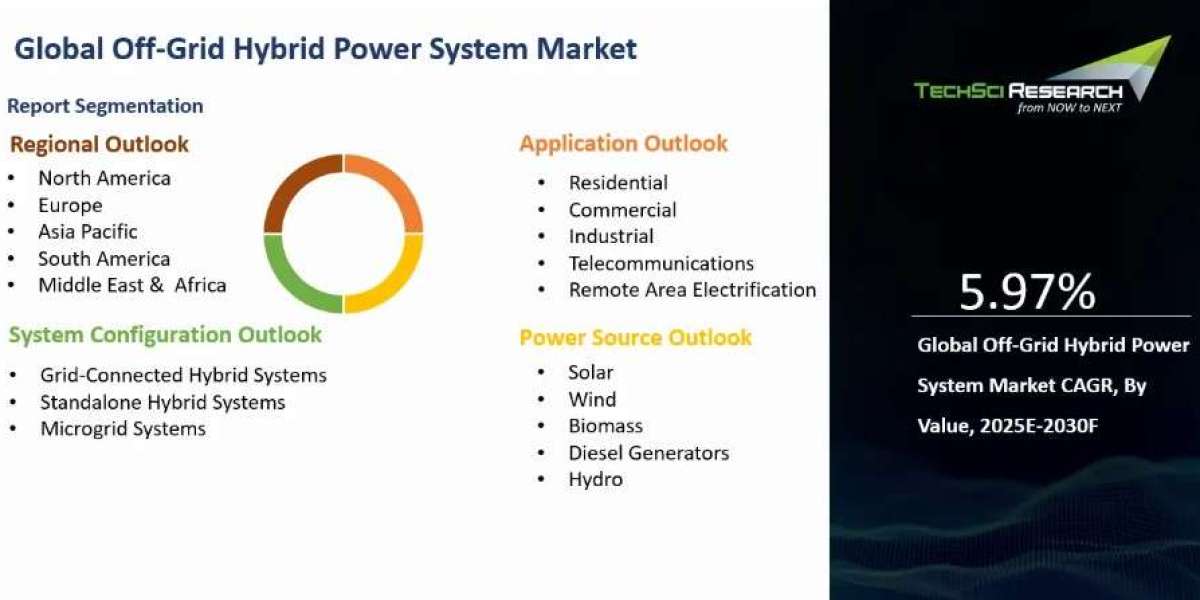According to TechSci Research report, “Off-Grid Hybrid Power System Market – Global Industry Size, Share, Trends, Competition Forecast & Opportunities, 2030F”, the Off-Grid Hybrid Power System Market was valued at USD 100.65 Million in 2024 and is expected to reach USD 143.81 Million by 2030 with a CAGR of 5.97%. The Off-Grid Hybrid Power System Market is being strongly driven by the growing demand for reliable, sustainable, and cost-effective energy solutions in remote and underserved regions where access to centralized grids remains limited or economically unviable. With rising global electricity demand and the increasing focus on reducing dependence on fossil fuels, hybrid systems that combine renewable sources such as solar, wind, and hydro with backup power from diesel or battery storage have emerged as a viable solution to ensure continuous power supply.
Governments and private stakeholders are heavily promoting decentralized energy generation to improve electrification rates in rural communities, particularly across regions with vast off-grid populations, while also supporting national targets for clean energy adoption. The declining costs of renewable technologies, advancements in battery storage, and improvements in system integration have made hybrid power systems increasingly competitive against conventional diesel-only solutions, which are often costly and environmentally unsustainable. Additionally, growing industrial activity, mining operations, military bases, and telecom infrastructure located in remote areas are creating significant demand for resilient off-grid power systems that can function independently of unstable grids.
Hybrid solutions not only enhance energy security but also reduce long-term operational costs by lowering fuel consumption and minimizing maintenance requirements compared to traditional generators. Furthermore, climate change concerns and global decarbonization commitments are pushing industries and governments to transition toward renewable-based hybrid systems as part of broader sustainability strategies. The market is also benefiting from technological innovations, including intelligent energy management systems, IoT-enabled monitoring, and AI-driven optimization, which enhance system efficiency, reliability, and scalability for diverse applications.
Financial institutions and investors are increasingly channeling funds into decentralized energy projects, recognizing their potential to deliver both economic returns and social impact by enabling energy access for millions. Moreover, the shift toward hybrid mini-grids and microgrids for community electrification is creating new business models and growth opportunities for developers, utilities, and technology providers.
Download Free Sample Report
https://www.techsciresearch.com/sample-report.aspx?cid=30541
Customers can also request 10% free customization in this report.
Based on the System Configuration, Grid-Connected Hybrid Systems segment held the largest Market share in 2024. The grid-connected hybrid systems segment within the global off-grid hybrid power system market is witnessing strong growth momentum, driven by the increasing need for reliable, cost-efficient, and sustainable energy solutions that seamlessly integrate renewable energy with conventional grid infrastructure. One of the primary drivers for this segment is the rising global demand for uninterrupted and high-quality power supply, particularly in regions where grid networks are prone to instability, high transmission losses, or frequent outages.
Grid-connected hybrid systems provide the dual benefit of utilizing renewable energy sources such as solar and wind for reducing dependency on fossil fuels, while maintaining a stable grid connection to ensure reliability and flexibility of power delivery. With the escalating focus on decarbonization and emission reduction, governments and industries alike are investing in hybrid systems that allow integration of renewable energy without compromising on grid stability, helping them achieve energy transition targets. Furthermore, the increasing penetration of electric vehicles, smart grids, and digital infrastructure is driving the need for flexible power systems that can adapt to fluctuating demand; grid-connected hybrids offer an effective solution by combining renewable generation, storage technologies, and backup power with the grid supply.
Cost reduction in renewable technologies, coupled with advancements in energy storage, digital monitoring, and control systems, has further enhanced the attractiveness of these systems by improving efficiency, scalability, and long-term cost savings. In industrial and commercial applications, grid-connected hybrid systems are becoming critical for companies seeking energy resilience and operational efficiency, as they not only reduce energy costs but also ensure compliance with sustainability commitments.
The segment is also benefiting from rising energy demand in urban centers, where hybrid integration helps balance peak loads, reduce grid congestion, and support demand-side management, creating a more resilient and intelligent energy network. Moreover, increasing adoption of distributed energy resources and microgrids is reinforcing the importance of hybrid grid-connected solutions as they provide an optimized way to balance decentralized renewable energy production with centralized grid supply.
The scalability of these systems enables deployment across diverse applications ranging from residential communities and commercial complexes to industrial facilities and institutional campuses, making them highly versatile in addressing the growing global energy demand.
Additionally, government incentives, favorable regulatory frameworks, and international investment flows into renewable energy infrastructure are significantly driving adoption in this segment, as hybrid systems align well with policies promoting energy diversification, climate action, and reduced grid dependency.
The growing awareness among consumers and industries about energy security, coupled with the pressing need to reduce carbon footprints, is further accelerating demand for grid-connected hybrid systems. Ultimately, this segment is propelled by a unique combination of technological progress, economic viability, and policy support, positioning grid-connected hybrid systems as a critical enabler in the global transition toward a cleaner, more resilient, and sustainable energy landscape.
Based on region, Asia Pacific is emerging as the fastest-growing region in the off-grid hybrid power system market, driven by rapid urbanization, increasing rural electrification initiatives, and strong government focus on renewable energy adoption. The region’s expanding population and rising electricity demand are creating a significant need for reliable and sustainable power solutions in remote and island communities.
Growing investments in solar, wind, and battery storage technologies, along with supportive policy frameworks, are further accelerating deployment. Additionally, the presence of cost-sensitive markets and increasing private sector participation are fueling innovation and scalability, positioning Asia Pacific as a key growth hub for hybrid power systems.
Major companies operating in the Global Off-Grid Hybrid Power System Market are:
Siemens AG
General Electric Company (GE)
Schneider Electric SE
ABB Ltd.
Eaton Corporation plc
Huawei Technologies Co., Ltd.
Tesla, Inc.
Delta Electronics, Inc.
SMA Solar Technology AG
Emerson Electric Co.
Download Free Sample Report
https://www.techsciresearch.com/sample-report.aspx?cid=30541
Customers can also request 10% free customization in this report.
“The Global Off-Grid Hybrid Power System Market is expected to rise in the upcoming years and register a significant CAGR during the forecast period. The off-grid hybrid power system market offers significant growth opportunities, fueled by the increasing demand for reliable and sustainable energy solutions in remote and underserved areas. Rising investments in renewable integration, particularly solar and wind, coupled with advancements in energy storage, are improving efficiency while reducing reliance on fossil fuels. Expanding rural electrification initiatives, strong uptake across mining, telecom, and defense sectors, and supportive government policies further strengthen the market outlook.
Moreover, the global transition toward carbon neutrality and the declining cost of renewable technologies are creating a favorable environment for innovative hybrid solutions, attracting both established providers and new market entrants. Therefore, the Market of Off-Grid Hybrid Power System is expected to boost in the upcoming years.,” said Mr. Karan Chechi, Research Director of TechSci Research, a research-based global management consulting firm.
“Off-Grid Hybrid Power System Market - Global Industry Size, Share, Trends, Opportunity, and Forecast, Segmented, By Application (Residential, Commercial, Industrial, Telecommunications, Remote Area Electrification), By Power Source (Solar, Wind, Biomass, Diesel Generators, Hydro), By System Configuration (Grid-Connected Hybrid Systems, Standalone Hybrid Systems, Microgrid Systems), By Region, By Competition, 2020-2030F”, has evaluated the future growth potential of Global Off-Grid Hybrid Power System Market and provides statistics & information on the Market size, structure, and future Market growth. The report intends to provide cutting-edge Market intelligence and help decision-makers make sound investment decisions., The report also identifies and analyzes the emerging trends along with essential drivers, challenges, and opportunities in the Global Off-Grid Hybrid Power System Market.
Contact
Techsci Research LLC
420 Lexington Avenue,
Suite 300, New York,
United States- 10170
Tel: +13322586602
Email: [email protected]
Website: www.techsciresearch.com







